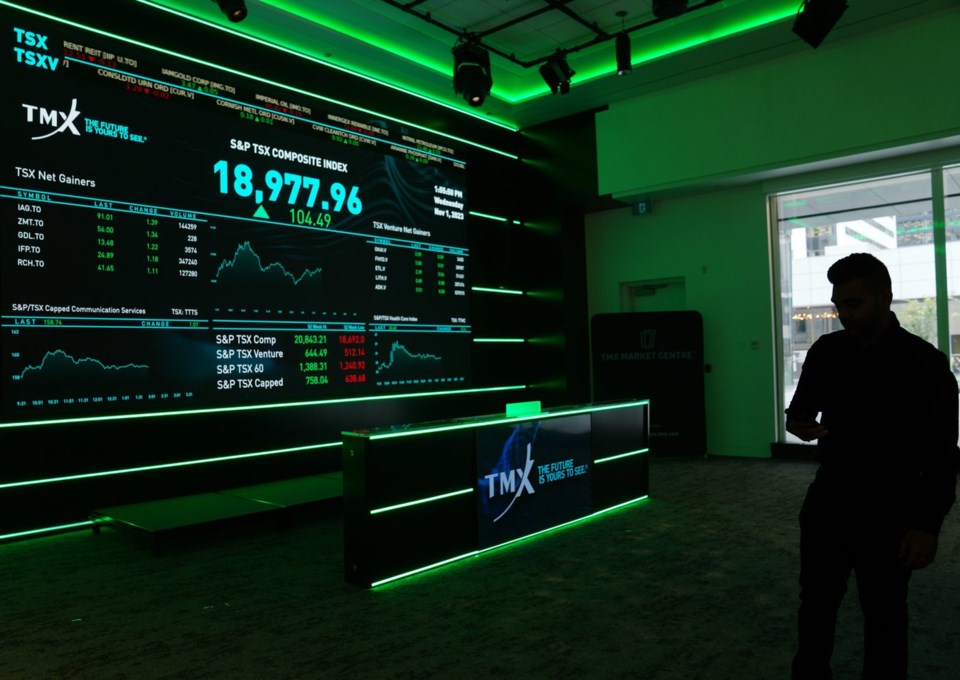Canada’s energy-heavy main stock index sank further into the red on Tuesday, weighed down by retreating oil prices.
The S&P/TSX composite index closed down 30.20 points at 24,072.51. The losses were in contrast to what happened on Wall Street, where U.S. markets saw gains.
The Dow Jones industrial average was up 126.13 points at 42,080.37. The S&P 500 index was up 55.19 points at 5,751.13, while the Nasdaq composite was up 259.01 points at 18,182.92.
While U.S. markets got a lift from Big Tech, which outperformed other sectors Tuesday, the TSX was pulled down by Canadian oil and gas stocks. Canada’s main stock market is heavily weighted in energy stocks, so its fortunes are closely tied to global oil prices. While oil has been surging recently on worries that escalating tensions in the Middle East could spread to the entire region, it gave back some of those gains Tuesday.
A barrel of Brent crude, the international standard, fell 4.6 per cent to $77.18 for its first loss in a week and a half. A barrel of benchmark U.S. crude, meanwhile, eased 4.6 per cent to US$73.57.
That made the energy sector the day's biggest loser, with the S&P capped energy index down 2.33 per cent.
“There's been obviously a lot of geopolitical risk being built into oil prices, and obviously with the Canadian market being so energy-heavy, it's been a big, big influence," said Michael Greenberg, head of Americas portfolio management with Franklin Templeton Investment Solutions.
"Today is a bit of a reversal, I guess, of that trend we've been seeing the last week or two where Canadian equities were actually outperforming the U.S."
One of the biggest fears that had been driving oil prices ever since last week, when Israel's military said Iran had fired missiles into the country, was Iran might cut off oil shipments through the Strait of Hormuz, through which one-quarter of the world's oil supply travels.
That has not happened, and the fact that oil continues to flow freely through the region has taken some of the air out of last week's crude price rally.
But Greenberg said there is still a great deal of uncertainty plaguing markets right now.
" 'Jittery' is definitely a good description. I think the news flow is definitely moving things around quite quickly. And it does make it a little bit more difficult in the short-term to position portfolios," he said.
"There's a very wide distribution of potential outcomes."
He added good portfolio managers right now will be trying to see past the short-term geopolitical volatility and look at the longer-term fundamentals. These include oil market supply-and-demand dynamics, but also factors like China's attempts at economic stimulus and the trajectory of interest rate decisions by central banks.
South of the border, a suite of reports shows the U.S. economy remains healthier than expected, which has forced investors to ratchet back expectations for how much the Federal Reserve will cut interest rates at its next meeting.
While investors don't want the economy to tip into recession, they do want central banks to keep cutting interest rates, since high interest rates are a drag on corporate performance and stock prices.
Greenberg said he will also be watching for the latest monthly jobs and unemployment data from Statistics Canada, set to be released Friday, because that could impact the Bank of Canada's next move.
"I think the trajectory is pretty certain, in the sense that many major central banks are looking to lower interest rates from the levels that they are today," he said.
"But the big unknown is really the speed that they're going to be able to do that."
The Canadian dollar traded for 73.22 cents US compared with 73.48 cents US on Monday.
The October crude oil contract was down US$3.57 at US$73.57 per barrel and the November natural gas contract was down two cents at US$2.73 per mmBTU.
The December gold contract was down US$30.60 at US$2,635.40 an ounce and the December copper contract was down 11 cents at US$4.46 a pound.
This report by The Canadian Press was first published Oct. 8, 2024.
Companies in this story: (TSX:GSPTSE, TSX:CADUSD)
Amanda Stephenson, The Canadian Press

